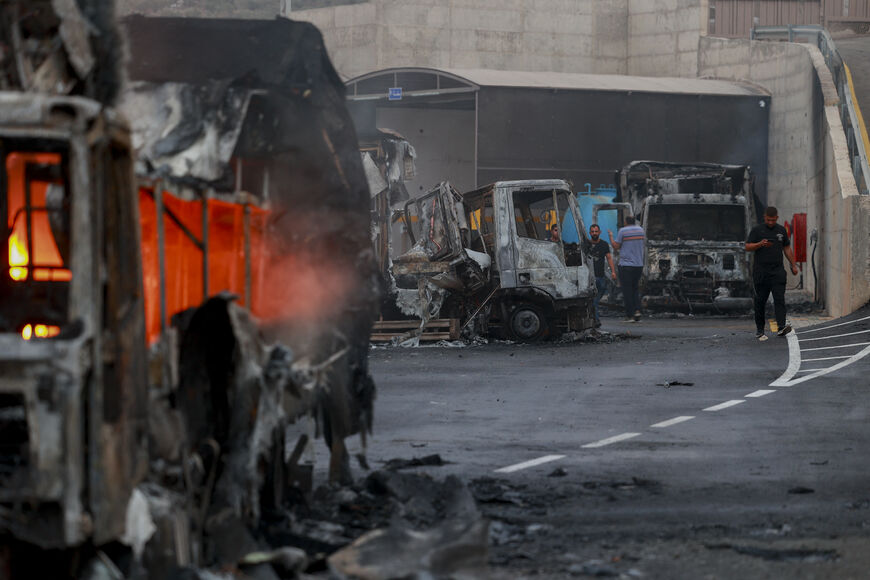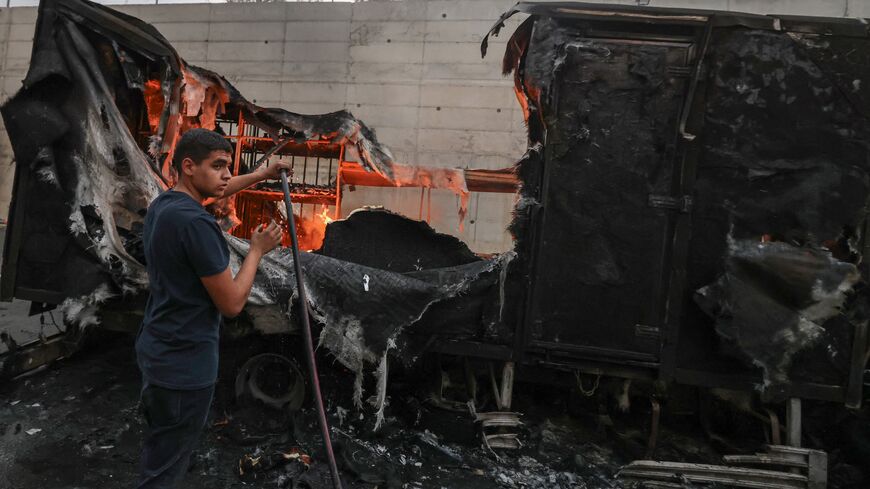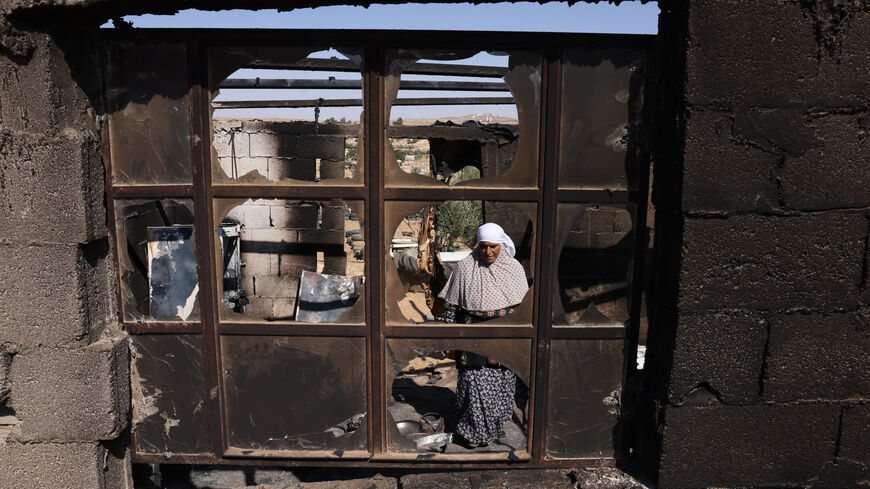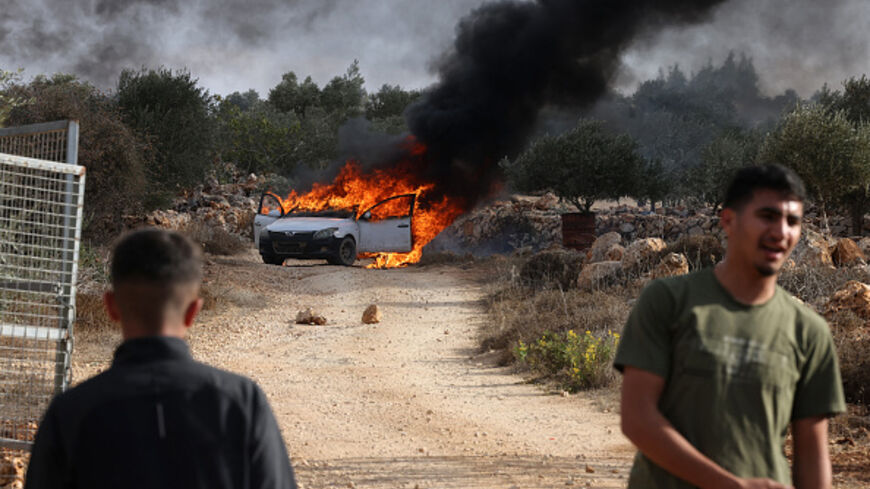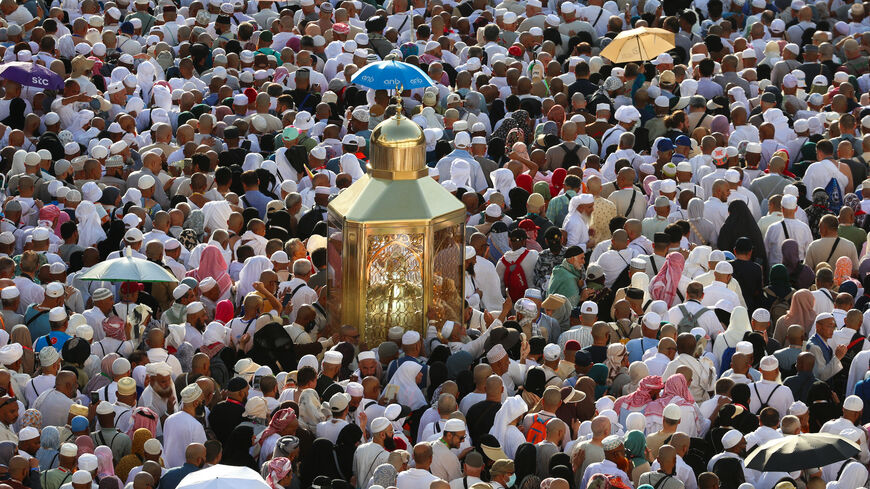Israeli settlers torch, vandalize West Bank mosque as attacks skyrocket
Israeli settlers torched a mosque in the central West Bank on Thursday amid a serious escalation in settler attacks across the Palestinian territory in recent weeks.
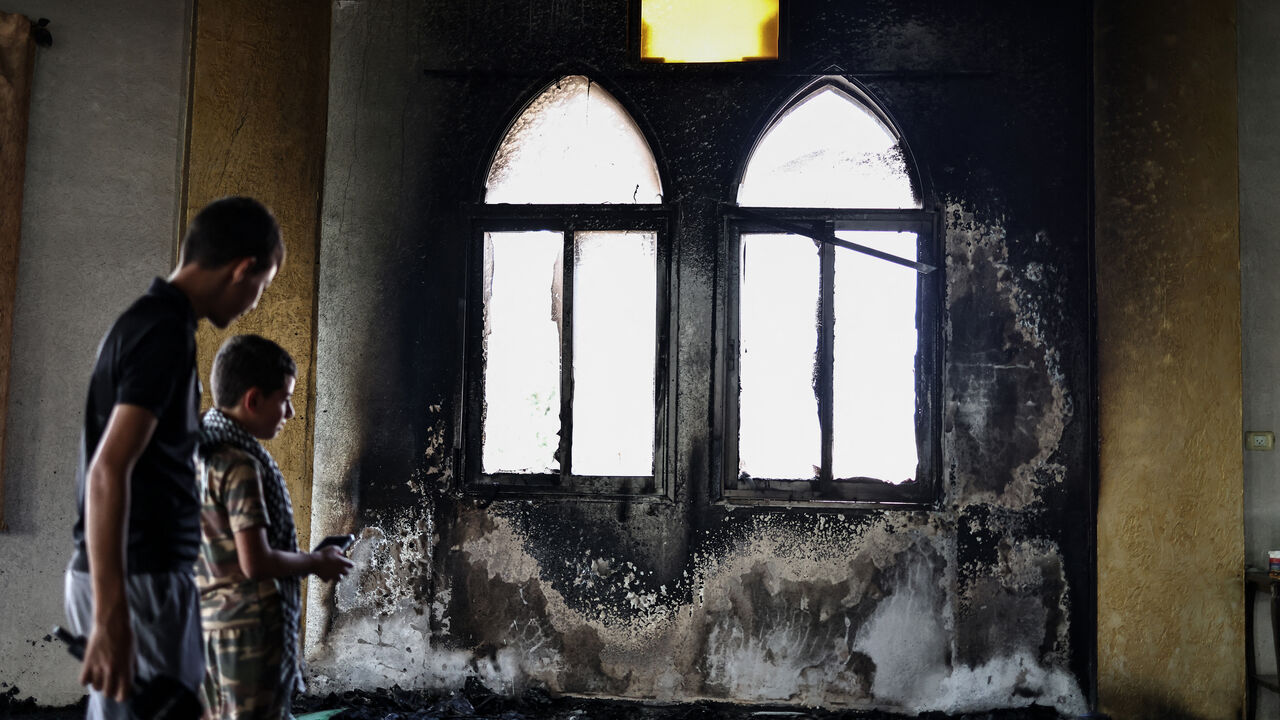
Israeli settlers torched a mosque in the central West Bank on Thursday amid a serious escalation in settler attacks across the Palestinian territory in recent weeks. The incident drew widespread condemnation from both Palestinian and Israeli officials.
What happened: In the early morning hours of Thursday, shortly before the Fajr prayer, dozens of settlers stormed the Hajja Hamida Mosque located between the towns of Deir Istiya and Kafr Haris in northwest Salfit. They poured a flammable liquid at the mosque’s entrance before setting it on fire, the official WAFA news agency reported.
The attackers also burned copies of the Quran, according to local Palestinian media outlets, including Qudsnet, and sprayed hateful anti-Arab and anti-Muslim messages in Hebrew on the mosque’s walls, such as, “We are not afraid,” “We will take revenge again” and “Keep on condemning” — a reference to Israeli condemnations over the surge in violence in the West Bank.
Citizens and local civil defense teams intervened to contain the fire, limiting damage to one of the mosque’s walls, local media reported.
أحرقوا المصاحف..
— المركز الفلسطيني للإعلام (@PalinfoAr) November 13, 2025
مليشيات المستوطنين تحرق مسجد الحاجة حميدة بين بلدتي ديراستيا وكفل حارس في سلفيت. pic.twitter.com/Ug5lRg8577
Shortly after, Israeli forces arrived at the site, conducted field investigations and then withdrew, according to WAFA.
The Palestinian Foreign Ministry strongly condemned the mosque attack as a “heinous crime committed by extremist settlers.”
In a statement released Thursday, the ministry said it “holds the Israeli government fully responsible for this dangerous escalation and the growing wave of settler terrorism, which is encouraged and protected by official policies aimed at displacing Palestinians and entrenching the colonial occupation.”
Similarly, the Ministry of Religious Endowments and Affairs condemned the arson attack against the mosque in a Thursday statement.
“The burning of the mosque clearly demonstrates the barbarity to which the racist Israeli incitement machine has descended against Islamic and Christian holy sites in Palestine,” the statement read.
Why it matters: Thursday’s incident comes days after dozens of masked Israeli settlers attacked the villages of Beit Lid and Deir Sharaf in Tulkarm on Tuesday. The settlers stormed al-Lada’in industrial area, setting fire to multiple vehicles and other property.
The violence also extended to agricultural lands, where settlers set ablaze metal sheds and tents belonging to a small Bedouin community in Beit Lid. Settlers reportedly threw stones at residents, injuring at least four Palestinians.
The settlers then fled to a nearby industrial zone and attacked Israeli soldiers who responded to the violence. Four settlers were arrested, three of whom were released by Wednesday, according to Israeli police.
رئيس بلدية بيت ليد يؤكد: هجوم واسع للمستوطنين على المنطقة الصناعية شرق طولكرم شمل حرق مركبات وأراضٍ زراعية وخسائر مادية كبيرة، في اعتداء هو الثاني خلال أقل من نصف شهر #بيت_ليد #طولكرم #هجوم_مستوطنين #راديو_الشمس pic.twitter.com/UjiCAWMFba
— Ashams - الشمس (@AshamsDigital) November 11, 2025
Israeli military commanders condemned Tuesday’s attack, blaming it on ultranationalist settlers.
In a rare public rebuke on Wednesday, Israeli President Isaac Herzog condemned the “shocking and serious” attack by “a handful of violent and dangerous individuals” in the West Bank, calling on concerned authorities to “act decisively to eradicate the phenomenon.”
“Such violence against civilians and army soldiers crosses a red line and I strongly condemn it,” he wrote on X.
The Israeli army’s chief of staff, Lt. Gen. Eyal Zamir, and the chief of the military’s Central Command, Maj. Gen. Avi Bluth, issued separate statements condemning the settler violence on Wednesday.
The commander of the army’s regional brigade in the northern West Bank, Ariel Gonen, also denounced the “grave” escalation.
“We recently witnessed a sharp and significant increase in the number of nationalist violent incidents in the brigade’s sector and throughout Judea and Samaria [the West Bank] in general,” Gonen said in a statement Thursday cited by Israeli media.
“This is a grave, developing and dangerous phenomenon that includes harm to uninvolved Palestinians and at times even to the security forces themselves,” he said.
“A fringe group of criminals and anarchists is taking the law into its own hands; these acts are unjustifiable and intolerable. This violence undermines the region’s security stability,” Gonen added, calling on the military to prevent “acts of violence and nationalist crime.”
Meanwhile, Israel's far-right government, led by Prime Minister Benjamin Netanyahu, has not commented on the surge in violence.
Background: Israeli settler attacks against Palestinians in the West Bank have been a regular occurrence for decades, but incidents have increased at an alarming rate in recent weeks, particularly during the ongoing olive harvest season, which peaks in October and November.
On Thursday, dozens of armed settlers stormed the Bedouin community of Khirbet al-Sidra, northeast of east Jerusalem, and blocked the community’s main road with a bulldozer, according to WAFA. Earlier that day, settlers attacked Palestinian olive harvesters in the town of Aqraba, south of Nablus, forcing them to leave their land.
In another incident on Wednesday night, Israeli settlers vandalized livestock equipment and plowed through a large area of Palestinian farmland in the northern Jordan Valley, WAFA reported. Settlers also stole iron fences and slashed the tires of a water tanker in the al-Deir area.
The exact number of settler attacks across the West Bank varies according to different sources.
According to the UN Office for the Coordination of Humanitarian Affairs, October 2025 saw the highest monthly number of Israeli settler attacks since the office began recording such incidents in 2006. In its weekly update, OCHA reported that October alone recorded 264 attacks in the West Bank, causing casualties, property damage or both — an average of eight attacks per day.
The Palestinian Authority’s Colonization and Wall Resistance Commission reported on Nov. 4 that a total of 2,350 attacks were carried out by both Israeli forces (1,584 attacks) and settlers (766 attacks) in the West Bank during October.
Data released by Israel’s security establishment this month documented 704 settler attacks between January and October 2025, compared to 675 incidents during all of 2024.
Since the war in Gaza erupted in October 2023, the West Bank has seen record numbers of settler attacks, including physical assaults and property destruction.
According to the Institute for Palestine Studies, Israeli settlers launched 7,154 attacks in the West Bank and east Jerusalem between Oct. 7, 2023, and Oct. 7, 2025.
Know more: Settlements in the West Bank and east Jerusalem, both internationally recognized as occupied territory, are considered illegal under international law and the Fourth Geneva Convention, which prohibits an occupying power from transferring its own civilian population into the territory it occupies.
Israel disputes this interpretation and has continued to expand settlements over the years.
About 230,000 Israeli settlers live in occupied east Jerusalem, and around 500,000 live in the rest of the West Bank, where there are approximately 300 settlements, according to the UN Office of the High Commissioner for Human Rights.
In August, the Israeli government approved the highly controversial E1 settlement project, which could effectively split the West Bank into two parts — cutting off the northern cities of Ramallah and Nablus from Bethlehem and Hebron in the south, and isolating east Jerusalem. The plan envisions the construction of approximately 3,400 housing units east of Jerusalem. According to the UN, advancement of this project would have severe consequences for the territorial contiguity of a future Palestinian state, making its realization increasingly unlikely.

